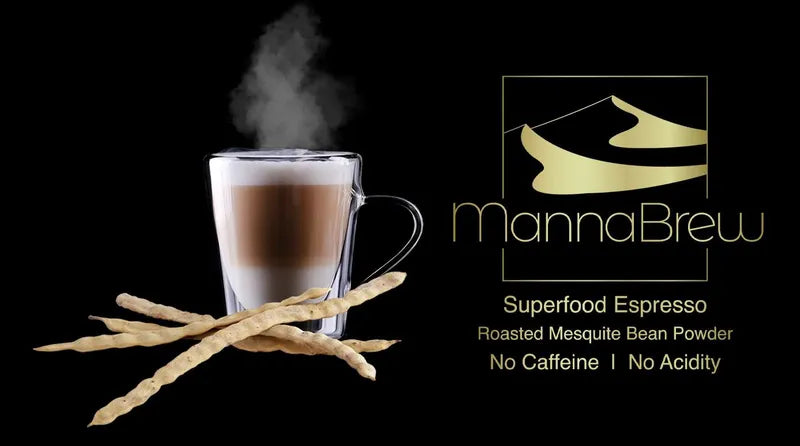MannaBrew vs Coffee: A Gut Health Comparison

In today’s wellness-focused world, more people are seeking alternatives to traditional coffee that offer sustained energy without the negative side effects. One such alternative gaining traction is MannaBrew, a caffeine-free beverage made from roasted mesquite seed pods. Unlike coffee, which can irritate the digestive system in some individuals, MannaBrew may actually support gut health. Here’s a closer look at how these two drinks stack up when it comes to your digestive well-being.
1. Caffeine and Gut Irritation
Coffee:
Coffee is well-known for its high caffeine content. While caffeine can boost alertness, it can also stimulate stomach acid production and cause gastrointestinal discomfort, especially in those with acid reflux, IBS, or gastritis. It can also lead to looser stools due to its laxative effect on the colon.
MannaBrew:
MannaBrew is completely caffeine-free, making it gentler on the stomach. It doesn’t overstimulate the digestive system, making it a good choice for people with sensitive guts or those trying to reduce their caffeine intake.
2. Prebiotic Content
Coffee:
Coffee contains small amounts of soluble fiber and can support some beneficial gut bacteria, but it also contains compounds like cafestol and kahweol, which may be harsh for certain individuals depending on how the coffee is prepared.
MannaBrew:
Mesquite pods, the main ingredient in MannaBrew, are naturally rich in prebiotic fiber, particularly galactomannans. These fibers nourish beneficial gut bacteria like Bifidobacteria and Lactobacilli, promoting better digestion and immune function. This makes MannaBrew a potential gut-friendly prebiotic beverage.
3. Acidity Levels
Coffee:
Coffee is naturally acidic, which can aggravate conditions like heartburn or acid reflux. For individuals with these sensitivities, daily coffee consumption may contribute to ongoing discomfort.
MannaBrew:
MannaBrew has a naturally low acid profile, which makes it a soothing choice for people looking to avoid acidic drinks. This can help reduce symptoms like bloating and indigestion, common side effects linked to regular coffee consumption.
4. Blood Sugar and Cravings
Coffee:
While black coffee has minimal sugar, many people add sugar or flavored creamers. Moreover, caffeine can cause fluctuations in blood sugar levels, which might impact cravings and gut-brain signaling.
MannaBrew:
The natural sugars in mesquite are low-glycemic, meaning they are digested slowly and do not spike blood sugar. Combined with fiber, this can promote a steadier metabolic response and help regulate appetite and digestion more consistently.
While coffee remains a beloved beverage worldwide, MannaBrew offers a gut-nourishing, caffeine-free alternative that can be especially beneficial for those with digestive sensitivities. Its prebiotic fiber and low acidity make it a great addition to a gut-conscious diet—without sacrificing the comforting ritual of a warm morning drink.
👉 Try MannaBrew Superfood today.
MannaBrew is made from 100% roasted Mesquite beans — that’s it.
There are no added sugars, caffeine, or artificial ingredients.
Key features of MannaBrew’s single ingredient:
Mesquite beans (from the Prosopis tree) are naturally sweet and contain:
- Dietary fiber
- Low glycemic carbohydrates
- Essential minerals (like calcium, magnesium, potassium, and iron)
- Protein
- Antioxidants
This makes MannaBrew a naturally caffeine-free, nutrient-rich coffee alternative suitable for:
- Pregnant or breastfeeding women
- People with diabetes or blood sugar concerns
- Children
- Anyone avoiding caffeine or stimulants
Key benefits of drinking MannaBrew:
🌿 1. 100% Caffeine-Free
MannaBrew provides a rich, coffee-like flavor without the crash, jitters, or sleep disruption — perfect for pregnant women, kids, and anyone avoiding caffeine.
🌿 2. Naturally Energizing
While caffeine-free, the nutrient-dense Mesquite beans support natural energy levels thanks to slow-releasing carbohydrates and essential nutrients.
💪 3. Packed with Nutrients
Mesquite beans are a natural source of:
- Magnesium
- Zinc
- Calcium
- Iron
- Dietary fiber
These help support metabolism, bone health, digestion, and immunity.
🌱 4. Gut-Friendly
MannaBrew contains prebiotic fiber, which helps feed the good bacteria in your gut and supports better digestion and gut health.
❤️ 5. Blood Sugar Friendly
The low-GI properties of Mesquite help regulate blood sugar levels — ideal for people managing insulin resistance, diabetes, or sugar spikes.
🌾 6. Naturally Sweet, No Sugar Needed
Its naturally sweet, nutty taste means most people enjoy it without needing to add sugar or sweeteners.
🌍 7. Sustainable & Ethical
MannaBrew is made from wild-harvested Mesquite trees — an invasive species in South Africa. By using it, you’re supporting job creation and land restoration.
🍼 8. Safe for the Whole Family
Because it's natural and caffeine-free, it’s safe for pregnant women, nursing moms, and children.





